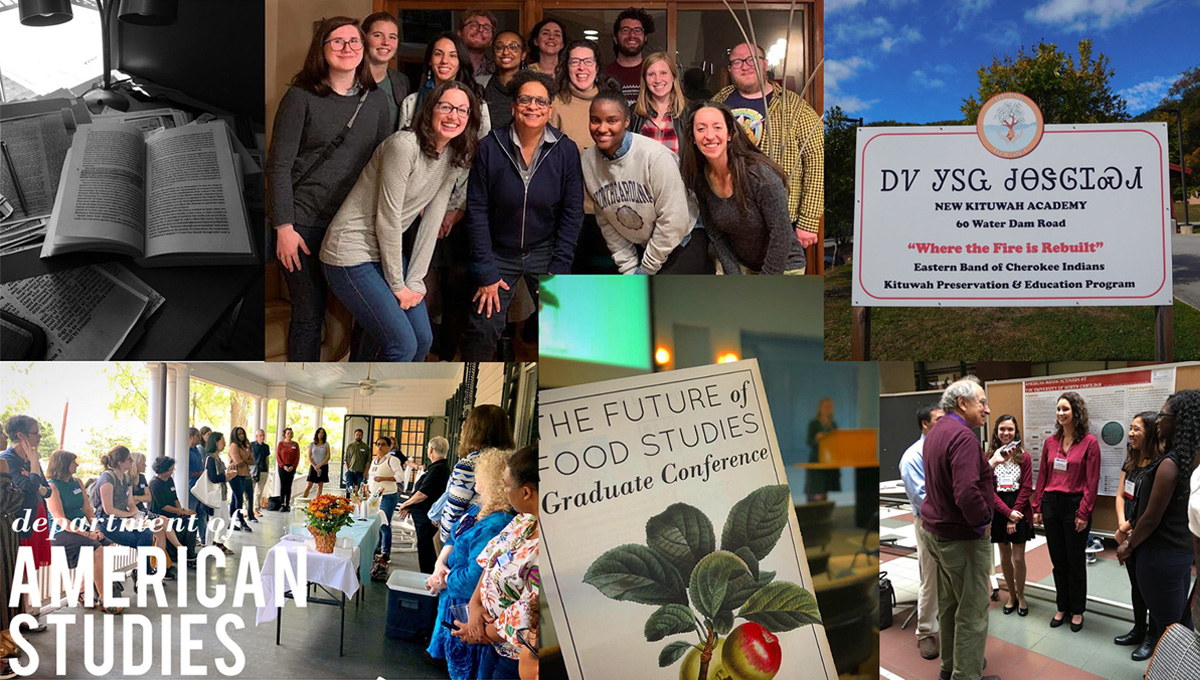Graduate Studies
About Our Program
We offer a Ph.D. in American Studies and an MA in Folklore. Our program values creative, ethical, and community-focused work that encourages students to explore the complex, variable, and contested nature of what it means to be American. We examine many kinds of evidence derived from multiple sources and genres (archival materials, oral history, literature, popular culture, music, art, food, bodily movement and adornment, landscape, architecture, and belief), accessed via multiple methodologies (historical, literary, ethnographic, and digital), and analyzed via theoretical perspectives that attend to race, gender, and sexuality; aesthetics and politics; region and transnational connection. We serve those who aim to teach at the college and university levels and pursue careers in museums, historical sites, archives, libraries, publishing, and other professional settings.
APPLY NOW
The application deadline for American Studies and Folklore is
Tuesday, December 12th, 2023
(for admission the following Fall)
We appreciate your interest in our Ph.D. Program in American Studies and M.A. Program in Folklore. We look forward to receiving your application. Consult this document for more details on the process.
- Submit your application electronically via the UNC Graduate School website
- Contact the Director of Graduate Studies with questions
Note: Students may arrange to take courses at other UNC system schools, including North Carolina State University and Duke University.
Overview
The study of Folklore focuses on creativity in everyday life, looking to the worlds of creative action—everything from quilt-making to hip-hop free-styling—that communities fill with meaning. The undergraduate major invites students to critically explore these worlds, coming to understand how identity finds voice in performances and things. The graduate program—which offers an MA in Folklore—challenges students to consider how folklore practice can become a vehicle for addressing the most pressing social issues of our times.
Graduate Studies
The MA program enables students both to gain a broad appreciation of the discipline of Folklore (including the complex history of the study of “traditional” or “vernacular” culture in a self-consciously “modern” and “global” world) and to develop expertise in a particular area of interest. Graduates of our program take jobs in the public sector, bring their folklorist’s eye to work in other professional fields as diverse as museum curatorship and medicine, and go on to further graduate work in Anthropology, Communication Studies, Film Studies, and Information and Library Science as well as in Folklore.
Courses taught by the core Folklore faculty offer students a perspective on the breadth of genres and issues addressed by our discipline. The three additional courses allow students to explore interdisciplinary connections and historical contexts for their thesis topics. These additional courses may be taught by Folklore faculty or may come from a variety of associated graduate programs, including Anthropology, Communications Studies, English and Comparative Literature, History, and Music. Students may also arrange to take courses at Duke University, including courses in the Department of Cultural Anthropology, ethnomusicology courses in the Department of Music, and courses offered by the Center for Documentary Studies at Duke University.
Ph.D. Minor
Students pursuing a Ph.D. in another department at UNC may qualify for a minor in Folklore by completing six courses chosen in consultation with the Coordinator of the Folklore Program.
All American Studies Ph.D. students take five required courses that provide grounding in the history, theory, and methodologies of the field. Students choose additional coursework inside and outside the department in accordance with their interests. Each student develops individual areas of specialization that draw on the strengths of the department and peer departments at UNC-CH, including art, cultural studies, literary studies, intellectual history, religious studies, American Indian and Indigenous Studies, folklore, African American Studies, and more.
Learn more about our Ph.D. timeline and requirements
Learn more about our Folklore M.A. timeline and requirements
View UNC’s Graduate School Handbook
We offer several fellowships that provide single-year awards to graduate students:

